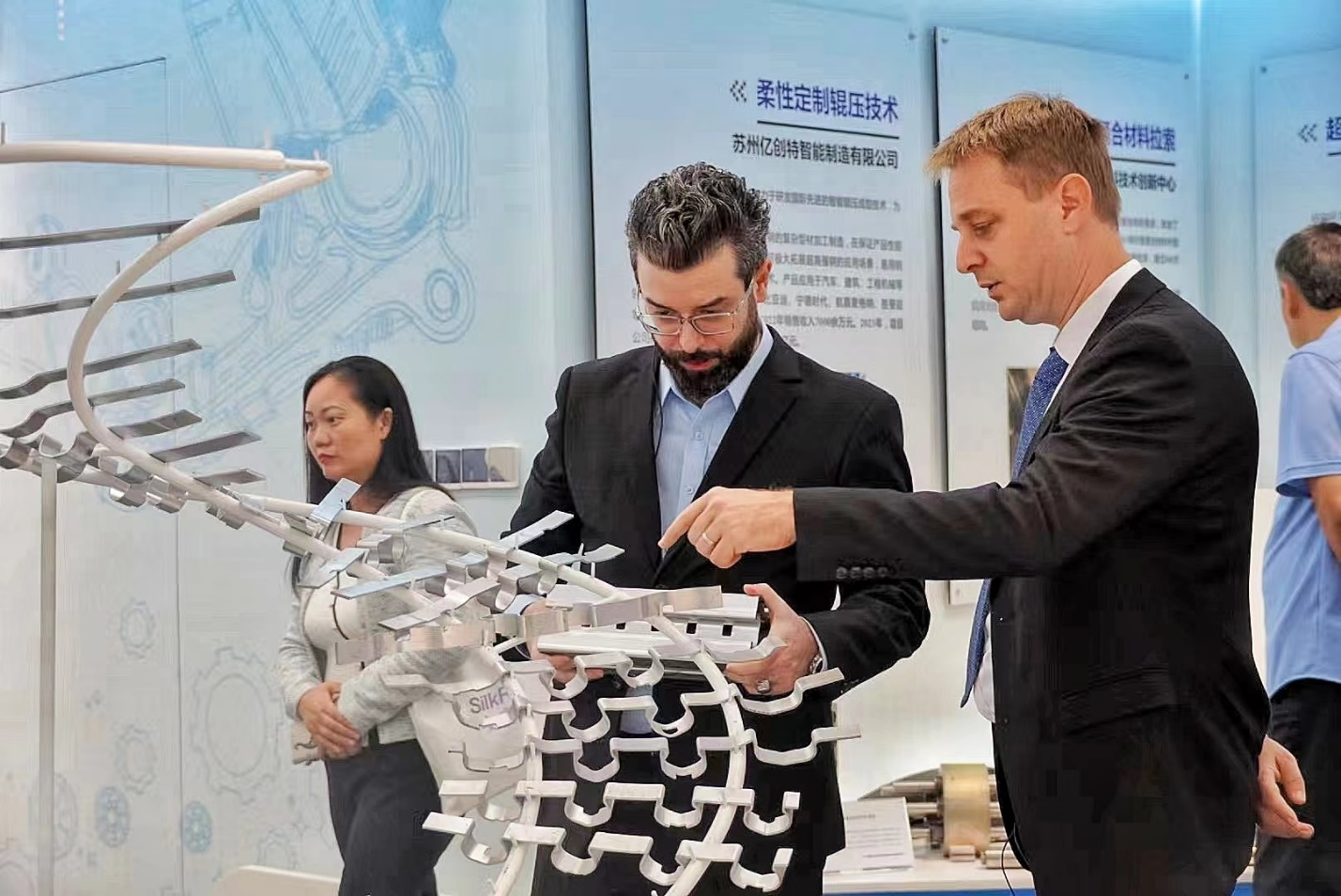Nanjing: Bridging the Past and Future through Innovation

Asad Khalil is visiting the exhibition center of JITRI. (PHOTO: Foreign Talent Research Center)
By Asad Khalil
During my three-day visit to Nanjing, organized by the Foreign Talent Research Center in China, I had the privilege of joining a delegation of foreign experts in China to gain a firsthand perspective on the city's innovative environment and its significant contributions to China's innovation landscape.
Nanjing, a city with a rich historical heritage, has managed to seamlessly blend its storied past with a forward-looking vision for the future. As we explored the city, it became evident that Nanjing has emerged as a prominent player in China's innovation ecosystem, acting as a catalyst for technological advancement and economic growth. The local government's dedication to creating an environment conducive to innovation is evident in the thriving Life Technology Innovation Park and the cutting-edge developments at the Nanjing Integrated Circuit Innovation Hall.
One of the most impressive aspects of our visit was witnessing the collaborative spirit between international and Chinese talents. Nanjing has become a melting pot for experts and innovators from all over the world, and the exchange of ideas and expertise that occurs within Nanjing's borders is a shining example of global cooperation in action. Our participation in the 2023 Nanjing International Science and Technology Cooperation and Exchange Conference showcased the city's dedication to forging partnerships with international experts and organizations.
The themed salon on "Exploring Open Innovation Cooperation Pathways for Nanjing in the New Era" exemplified the city's commitment to open innovation, a key driver for success in the 21st century. In conclusion, our visit to Nanjing offered a glimpse into a city that is not only embracing innovation but actively shaping it. The collaborative atmosphere, coupled with a commitment to global cooperation and an enabling environment, positions Nanjing as a key player in China's technological transformation. It was a privilege to be part of this journey, and it is evident that Nanjing's story of innovation and international collaboration is one that the world should take note of and learn from.
I believe that education, both in a general sense and through legal education, plays a pivotal role in a nation's development. It fosters human capital development, equipping individuals with the skills and knowledge needed to contribute to various sectors, from technology and healthcare to manufacturing and service industries. A well-educated workforce is more adaptable to evolving market demands and can engage in higher-level problem-solving and innovation.
In the context of legal education, it produces professionals who are vital in upholding and evolving the legal framework that underpins innovation and development. These legal experts ensure that the legal system remains relevant and adaptable to the changing needs of society, promoting fairness and justice while allowing for the flexibility required to accommodate new technologies and emerging industries.
A symbiotic relationship exists between legal education and innovation, where the legal profession both relies on and fosters innovative thinking. This interaction, in turn, ensures that the legal system remains a catalyst for progress in various spheres of society. A well-educated population fuels economic growth, underpins technological advancements, and strengthens the legal system, collectively contributing to a nation's overall development.
Nanjing's commitment to innovation doesn't end at the borders of China; it reaches far beyond, showcasing the city's potential on an international level. Its universities and research institutions engage in international academic exchanges, attracting talent and ideas from across the globe. Collaborations with international partners, including universities and corporations, open up avenues for cross-cultural innovation, ensuring that Nanjing remains at the forefront of global advancements.
Furthermore, Nanjing’s forward-thinking approach extends to its investment in emerging technologies. It has made significant strides in areas such as artificial intelligence, biotechnology, and renewable energy, which have attracted international attention. The city has hosted numerous international conferences and events related to these fields, drawing experts and entrepreneurs from around the world to share ideas and foster international cooperation in innovation.
With its international reputation as a hub for innovation, Nanjing is further solidified by its dedication to sustainability. The city is actively engaged in eco-friendly initiatives, demonstrating its commitment to environmental stewardship and providing a model for other cities looking to balance innovation with ecological responsibility.
Overall, Nanjing's holistic approach to innovation, combining educational excellence, strategic government support, international collaboration, and a commitment to sustainability, positions it as a compelling example of a city that is not only driving national development but also making a significant impact on the global stage in the realm of innovation.
It is also worth mentioning the significant role of The Foreign Talents Research Center (FTRC) in serving as a vital hub in fostering a more welcoming and productive environment for foreign talents in China. FTRC actively encourages research and innovation collaboration, provides cultural and language education, organizes networking events, and awards outstanding contributions. By offering such a comprehensive range of services, FTRC plays a pivotal role in attracting and retaining international talents and promoting innovation and knowledge exchange in China.
Asad Khalil, professor of Southwest University of Political Science and Law







